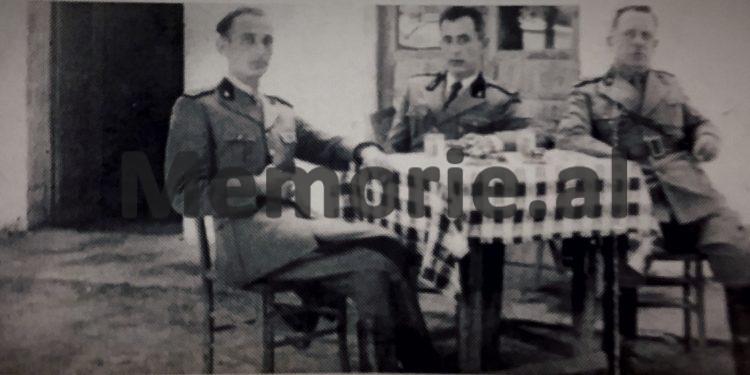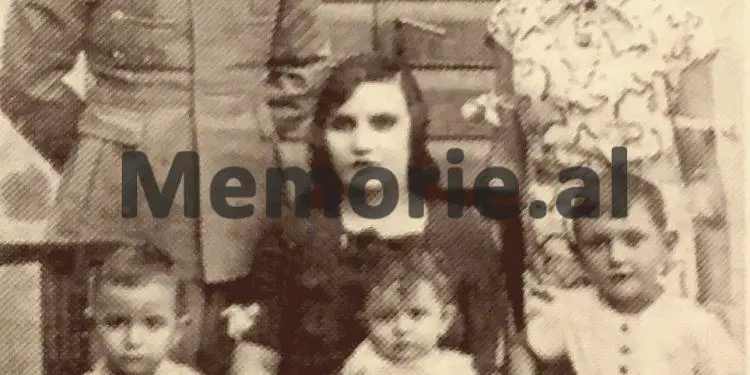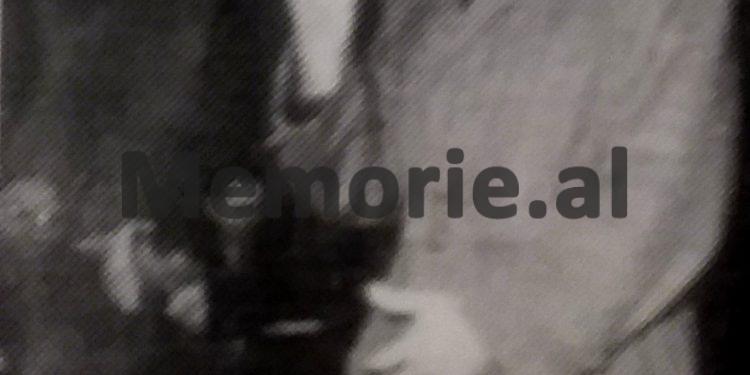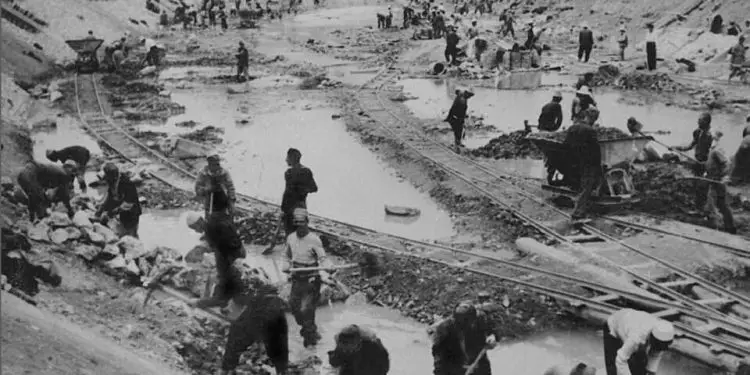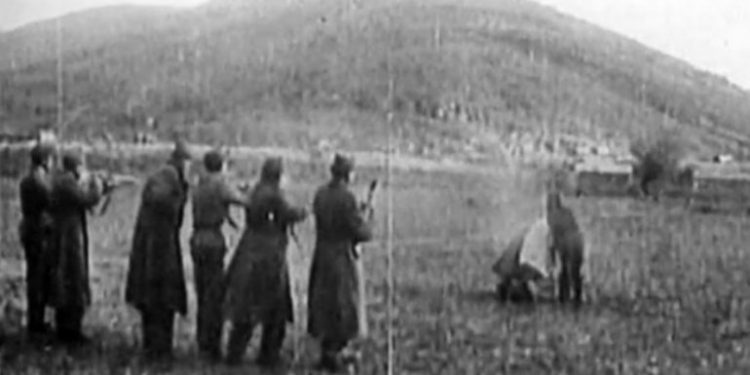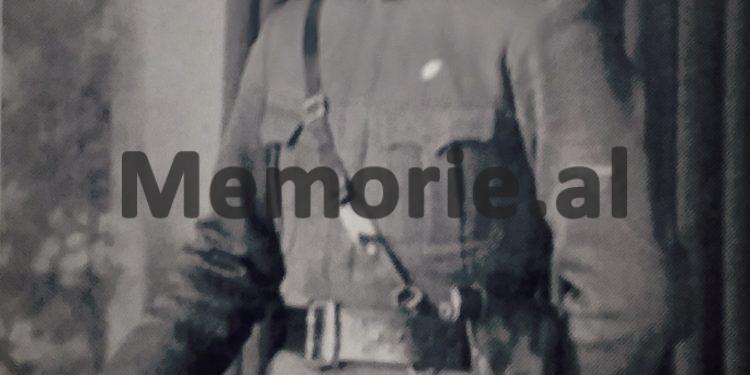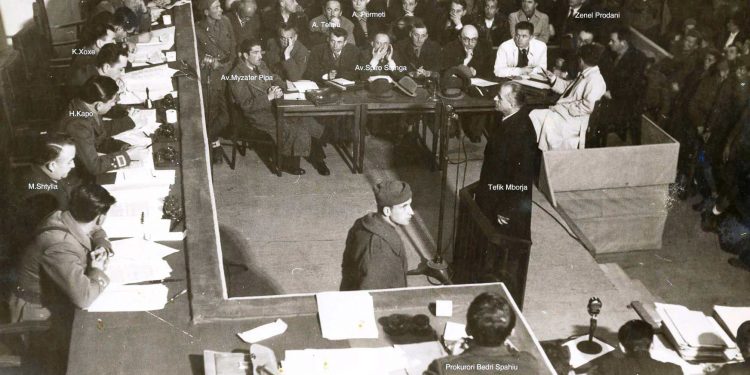Dashnor Kaloçi
Memorie.al publishes the unknown story of Sulejman Vuciterna from the tribe that originates from Verbovsi of North Drenica, who at the age of 18, had under his command over 400 armed men and in the capacity of the committee commander, Sulejmani of together with Bajram Curri and Hasan Prishtina, signed the petition for the revision of the borders that had been established in 1913 and the reunification of all Albanian lands, which led to his death sentence by the Serbian government of Paiqiit.
Sulejmani came to Albania after a scholarship given by Hasan Prishtina for Kosovar students and schooling in the Elbasan Normal and then in the Military Academy of Turin in Italy, from where he returned home serving in the cities of Kavaja, Korça, Shkodra and Berat. , first in the Rear Sector sector of the Royal Army, and then as Commander of the Officer Training School of the Albanian Monarchy
The resignation of Sulejman Vuheqiterna after the fascist aggression of April 7, ’39 and his return to Kosovo where he joined the Kosovo Defense Committee and his appointment as Commander of the Northeastern Border Protection Command of Albania, where he fought several battles. against the Chetnik forces of Dra forca Mihajlovi,, in Kolashinin, Novi-Pazar, Montenegro, etc.
Sulejmani returned to Albania in the autumn of ’44 and was arrested by the communists on November 14 of that year, where he was chained and sent by some partisans to the village of Shupal, at the foot of Dajti Mountain, where they were kept very isolated from the former. -senior officials of Albanian governments since the time of Ismail Qemali.
Sulejmani was sentenced to 30 years in prison in the Special Court, where although he came as a witness and defended the mother of the People’s Hero, Xhezmi Delli, declaring that he was a patriot and had saved his son several times, the court decision was left in force and he was sent to serve his sentence in Vloçiin Camp, where he tried to commit suicide out of horror, cutting his toes with his waist, and the Commander of the Camp, Tasi Marko, did not allow him to be sent to the hospital, but left him he died and he was still buried without his soul coming out… ?!
It was mid-November 1944, when partisan forces stationed on the outskirts of the capital, at the foot of Dajti Mountain and controlling almost the entire eastern part of the city of Tirana, waited hour by hour for the withdrawal of German forces withdrawing from Rruga e Elbasan in the direction of Shkodra, to enter as triumphant in the liberated capital. Although the war was not over, the communists had begun to settle accounts, and special partisan teams, according to the lists they had received from their headquarters still in the Priska area, went from neighborhood to neighborhood and house to house to make arrests or eliminate those they considered “enemies and criminals of the people.” At midnight on November 14, special partisan teams managed to arrest Colonel Sulejman Vuciterna, who was at his home (today the Greek embassy), somewhere near the capital’s suburban neighborhood of “Black Bird”. But who was Colonel Vuciterna, what was his past and why was he included in the “black lists” of the communists to be arrested by them?
Who was Sulejman Vuititerna?
He was born on September 11, 1898 in the town of Vuciterna in Kosovo. Sulejmani comes from the door of the Kastrats of Verbovs in North Drenica, where the first of that tribe, Mulla Ali Kastrati (Shkoza) had moved from Bushati of Shkodra, where his family’s early origin is, and settled initially in the Gjakova Highlands, circa 1609. The Vuciterna family, which bore the surname of the birthplace of its ancestors, is known throughout the province as one of the most patriotic families that has participated in all the wars against foreign invaders that have invaded Kosovo… Sulejmani’s father, Mulla Bajram Kastrati, was a Muslim cleric and together with his two sons, Isufi and Rexhepi, were well known as the leaders of Drenica and for their activity for the benefit of the national cause, they were always persecuted to be arrested by the invaders. turq. Sulejmani, after being educated in his hometown of Vuciterna, dropped out of school and at the age of 16 took up arms and joined the committees in what is known as the “Kosovo Kachak Movement”. For his extraordinary skills as an organizer and leader, in 1916 when he was not more than 18 years old he was appointed commander of the Verbovca gang and had under his command over 400 armed men. After the formation of the Serbo-Croatian-Slovenian kingdom, in 1919, Serbian gendarmerie forces went to the village of Verbovce and surrounded his house to arrest him. But they did not succeed, because Suleiman, fighting inside the tower, managed to break the siege and left. In retaliation, Serbian gendarmerie forces burned down his tower and buried alive his brother, Isuf, a Muslim cleric. After this event, Sulejmani became very famous at the head of the Verbovca gang because he was very young and around 1922, in the capacity of committee commander, together with the two deputies of the Albanian parliament, Bajram Curri and Hasan Pristina, signed the petition for the revision of the borders that were established in 1913 and the reunification of all Albanian lands, which led to his death sentence by the Serbian government of Paiqiit.
He graduated from the Academy of Turin
After the death sentence given to you by the Serbs, pushed and by the family, having no other choice, Sulejmani decides to come to Albania. After leaving all the close people and family in Kosovo, at the end of 1922, together with some members of his gang, he set off towards the Montenegrin-Albanian border, after crossing Lake Shkodra by swimming. Immediately after coming to Albania, he continued the school he had left in his hometown when he was 16 years old. After that, benefiting from a state scholarship from the contingent of Kosovar students paid from the funds raised by Hasan Prishtina, he enrolled in the Elbasan Normal which he finished there in 1929. After finishing the Elbasan Normal School, Sulejmani was settled in Tirana temporarily where he started a family by marrying Faika Spathara (with whom he had four sons and a daughter), who was the daughter of the well-known career soldier (from Skrapar) Colonel Mustafa Spathara. At that time Suleiman received a state scholarship and went to Italy to the Military Academy of Turin which he graduated with honors in 1933, graduating in the Infantry. After graduation he returned to Albania and was appointed to the General Command of the National Army, in the Backyard sector. In this sector, Sulejmani worked for less than a year and then won the right to a one-year specialization in Gratz, Austria, for the branch of Prapavija, which he completed in June 1935. After returning from specialization he is appointed to the units of the Albanian National Army, in the cities of Kavaja, Korça, Shkodra and Berat. He works for some time in these cities, by the General Command of the Army, he was proposed to go as a lecturer at the Royal School of Officers in Tirana where he worked for some time as a lecturer at this school, he is proposed by the Commander of General of the Albanian Army, General Xhemal Araniti, to be appointed commander of the School of Officers, which King Zog immediately decreed. He served in this position until April 1939, when Italy carried out the fascist aggression against Albania.
After April 7, 1939, he left for Kosovo
After April 7, 1939, Sulejman Vuititerna refused to serve in the National Army and after resigning, returned to civilian life. Having no means of subsistence to support the family, as she lived only on the salary he received as an officer, he left for his hometown in Kosovo, which he had left since 1922, where he had all his relatives. of the family. In 1941, seeing the situation created and after the constant request of the nationalist party of Kosovo, Sulejmani was mobilized again in the ranks of the Albanian National Army. In addition to military service, he joins the Kosovo Defense Committee. In the same year, Sulejmani was appointed Commander of the Northeastern Border Protection Command of Albania, starting from Montenegro with Serbia to Llap, near the border with Bulgaria. Sulejmani performed this important and very difficult task from the autumn of 1941 until the autumn of 1944, when he returned to Tirana. During those three years in Kosovo at the head of the forces he commanded, together with the volunteers he had recruited himself, he fought fiercely against Draraza Mihajlovi çet’s Chetnik forces, efforts which were made mainly in Kolashinin, Novi Pazar, Montenegro etc. Also, from the beginning of March 1943, at the head of the military and volunteer forces he commanded, Lieutenant Colonel Vuititerna again fought fiercely against the Serbo-Montenegrin-Chetnik-Communist forces, which were deployed in the area of Tushic, Cukovski, Previja, Rezalla, Okllac, up to the area of Rashku. In these fierce fighting that lasted from 4 to 26 March, the forces commanded by Sulejmani came to the aid of an artillery battalion of the Albanian National Army, which included two Italian officers with the rank of captain, who they were called Rudi and Sada. From these battles the forces commanded by Sulejmani came out with small losses, while the Serbo-Montenegrin ones suffered considerable losses. For this result he achieved on the battlefield, Lieutenant Colonel Vuciterna was awarded the rank of Colonel by the General Command of the National Army.
With the nationalist leadership of Kosovo
During his years in Kosovo, Sulejmani took an active part and became one of the main supporters of the Albanian National-Democratic Movement, or as it is otherwise known, the “National Front of Kosovo”, led by Professors Ymer Berisha and Luan Gashi, as well as Bedri Pejani, Bedri Gjinaj, Rexhep Mitrovica, Mehmet Gradica etc. Sulejmani, together with Mehdi Elez and Hajredin Spahiu, had constant contacts with the British Intelligence Service (Intelligence Service), for the realization of the agreement made by the Albanian National-Democratic Movement with that intelligence service, for the help that the British government would give you Kosovo nationalist forces in the fight against the Italian invaders. Sulejmani, in addition to being a talented career soldier, was also a Western-leaning intellectual, who was quite fluent in several foreign languages, such as Turkish, Serbo-Croatian, Italian, German and English. He, together with a group of Kosovar intellectuals who had graduated from Western universities, made a very active propaganda among the people, about the ties and cooperation they had with the Anglo-American allies, and the help they were giving to win the war against the fascist axis.: Rome-Berlin-Tokyo. From the beginning of the autumn of 1944, Vuciterna, as a professional career soldier, responded to the orders of his superiors to leave Kosovo and returned to Tirana, where he had left his family since 1939.
He returns to Tirana and is arrested
After leaving Kosovo, Sulejmani came and settled in Tirana next to his family in the house he had built himself (where today is the Greek embassy) since the early 1930s. He had never even thought about what would happen to him later after coming to his house (arrest), because throughout his military career, he had worked and fought only for Albania and for that, he was sentenced to death by the forces. Chetnik – Communist (Serbo-Montenegrin), during the time he fought against Draza Mihajlovic in Kosovo. Thus, feeling completely clean about what he had done all his life, he returned to his home in Tirana, very aware. But Colonel Vuciterna’s accounts did not seem to “frame” at all those of the communists who had come to power and could not wait to settle accounts with those whom they regarded as “political opponents or enemies of the people.” So, a few days after his arrival in Tirana, still without getting along well with his family, at midnight on November 14, 1944, when the Germans had not yet left the capital, a special partisan team appeared at his house which arrested, telling the family: “As for a clarification in command.” After that, the special team of partisans joined him with some other “colleagues”, and thus chained three by three, on foot they set off for Shupal, at the foot of Dajti mountain, where some old barracks type army barracks guarded by armed partisans, served as a prison. In those barracks where dozens of other people were detained (most former senior officials of the Albanian government since the time of Ismail Qemali), such as ministers, deputies, prefects, senior military, etc., Sulejmani stayed until November 21, when yes thus bound, three of them were sent back on foot to Tirana, “settling” them in the old prison (today “Mine Peza”).
In the Special Court, 30 years in prison
In the Old Prison of Tirana, for four months, Colonel Sulejman Vuçiterna was subjected to inhuman torture until he appeared in the Special Court, which opened in early March 1945. The trial for Sulejmani took place on March 29, where there were several mutual retorts between him and Prosecutor Bedri Spahiu. In that court, Sulejmani’s lawyer was appointed Spiro Stringa, who with high professionalism did his best to facilitate his client, finding as witnesses to defend him, some people, such as: Hajri Jegenin, Gjon Llambushi and Fehmi Poshi. He also made a great defense of Sulejmani, Habibe Delli (mother of Xhezmi Delli, communist “People’s Hero”), who was a neighbor of the Vuciterna family. She went herself and declared in the courtroom (without calling anyone), saying: “I know Suleiman as an honest man and very correct, because I have a neighbor. Being a senior officer, in one case I know that he When the well was prepared for Xhezmi, he escaped the siege, thanks to the information of Mr. Sulejman, as well as the sending of even the small amount of ammunition he had with him. “on the mountain to fight, because he had a kidney. Why should this man be in the dock as a criminal?” After that, the Special Court sentenced Sulejmani to 30 years in prison and forced labor together with Sokrat Dodbiba, Et`hem Cara, Anton Kozmaçi, Sami Koka, Mihal Zallari, Ndoc Naraçi and Lazër Radin. Sulejmani “did not have the luck” to fulfill the sentence given, because he died on October 15, 1945 in the camp of Vloçisht, in the swamp of Maliq where he was serving his sentence, cutting his toes with his waist. According to some testimonies from his accomplices in that prison, the Commander of the Camp, Tasi Marko, did not accept the request of doctor Hysenbegasi, to send Sulejmani to the hospital of Korça, but buried him half-alive, without leaving his soul in a pit. along the reeds of the Maliqi swamp, so that his bones could never be found./Memorie.al




